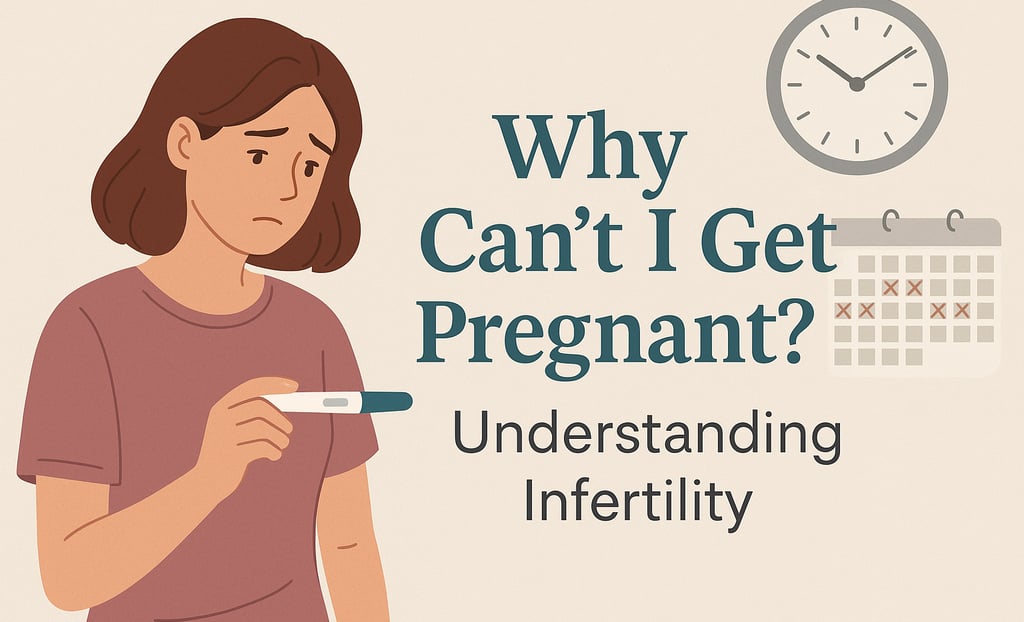Why Can’t I Get Pregnant?
Struggling to get pregnant? Discover the emotional and medical reasons behind infertility and what you can do next, written with clarity and compassion.
DIAGNOSIS & TESTING
6/17/20253 min read


When you’ve been trying to conceive for months or even years, it’s one of the most painful and confusing questions you can ask yourself:
“Why can’t I get pregnant?”
You're not alone — and you're not doing anything wrong. Infertility affects around 1 in 7 couples in the UK, and it’s often caused by a combination of factors. This guide explores the most common emotional, physical, and lifestyle-related reasons for infertility, written in clear, compassionate language.
Whether you're at the very beginning of your journey or feeling lost after months of trying, this is a starting point to help you understand your body — and what steps you can take next.
What Is Infertility?
In medical terms, infertility is defined as:
Under 35? Trying to conceive for 12 months or more without success
Over 35? Trying for 6 months or more without getting pregnant
But infertility isn’t always that clear-cut. Some people have regular cycles and timed sex and still don’t conceive. Others may feel something is “off” before a full year has passed. That’s why it’s important to trust your instincts and speak up if you think something isn’t right.
If you're unsure whether it's time to seek help, you might want to read:
👉 Is It Time to Get Help? Recognising the Signs of Infertility
👉 How to Talk to Your GP About Fertility Concerns
The Emotional Weight of Not Knowing
Trying to conceive without success takes a heavy emotional toll. You may feel frustration, jealousy, grief, or shame — emotions that often go unspoken.
Contrary to popular belief, infertility isn’t caused by “trying too hard” or “just relaxing.” But stress is real, and it can intensify when you're waiting for answers that never seem to come.
You’re not being dramatic. You’re facing something that many people experience in silence.
If you're struggling emotionally, you may find comfort in:
👉 The IVF Grief Cycle
👉 How to Cope When Friends Get Pregnant Easily
Common Medical Reasons for Infertility
There are many different causes of infertility — some physical, some hormonal, some unexplained. Here are the most common:
Female Factor Infertility
Ovulation issues (e.g. PCOS, hypothalamic amenorrhoea)
Low ovarian reserve or poor egg quality
Blocked fallopian tubes
Endometriosis
Uterine abnormalities (e.g. fibroids, polyps, septum)
👉 What Is AMH and Why Does It Matter? (Post #7)
👉 Endometriosis and IVF: What You Need to Know (Post #17)
Male Factor Infertility
Low sperm count or motility
Abnormal sperm shape (morphology)
Hormonal imbalances or blockages
👉 Male Factor Infertility: What Tests Are Done? (Post #12)
Unexplained Infertility
In about 1 in 4 couples, no obvious cause can be found — this is called unexplained infertility. While it’s frustrating, it doesn’t mean there’s no hope. Many people with unexplained infertility go on to conceive, either naturally or with help.
👉 Fertility Tests: What to Expect and What They Mean (Post #3)
Lifestyle Factors That May Affect Fertility
Lifestyle on its own rarely causes infertility — but it can contribute to it. Here are factors that are known to impact egg and sperm health:
Smoking (both tobacco and cannabis)
Heavy drinking or binge drinking
High caffeine intake (over 2–3 cups/day)
Excess body weight or being underweight
High stress and overexercising
Exposure to environmental toxins like BPA, phthalates, and non-natural fibres
👉 Non-Natural Fibres and Fertility: Could Polyester Be a Problem?
👉 Plastics and IVF: Why BPA-Free Matters
Helpful external resources:
Tommy’s: Trying to conceive – health and lifestyle
What You Can Do Next
If you're wondering why you're not getting pregnant, here are your next steps:
Speak to your GP — especially if you've been trying for over 6–12 months
Track your cycle — learn about ovulation and timing
Get tested — including hormone panels, semen analysis, and ultrasounds
Adjust your lifestyle — focus on nutrition, sleep, and stress management
Ask for a referral to a fertility clinic — especially if you’re over 35
👉 How to Talk to Your GP About Fertility Concerns (Post #2)
👉 Fertility Tests: What to Expect and What They Mean
Gentle Reminders
This is not your fault
You are not alone
Infertility is common, treatable, and worthy of care
You are allowed to feel sad, angry, or numb — all of it is valid
The next step may be testing, or it may be just talking about it for the first time. Whatever it is, you deserve support.
© 2025. All rights reserved.
